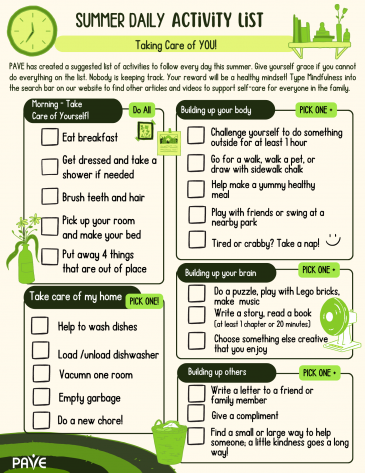A Brief Overview
Every family experiences holidays and end-of-year transitions differently. This article provides a sampling of ideas for families with children experiencing special healthcare needs. If a child also experiences behavioral difficulties, you may wish to read Home for the Holidays: The Gift of Positive Behavior Support
Here are some quick takeaways:
- Keep to your everyday schedule and routine as much as possible to minimize medical and behavioral impacts.
- Add fun with home-based holiday activities and traditions tailored to your family’s needs or select family or group activities which work with your child’s medical needs.
- Plan and save surprises too: Mix up the activities so children can help with some planning and enjoy a few surprises.
- Plan for health and safety if travel is on the schedule.
- Families need a village: Help is a present, but sometimes you must ask for what is on your list.
- Gratitude is a gift: Moments of thankfulness calm the mind. For additional stress-reducers, PAVE provides a practical gift: Self-Care Videos for Families Series. We also offer short videos to help everyone find calm (Try Hot Chocolate Breath!): Mindfulness Video Series.
Full Article
Decide Which Routines and Schedules Might Be “Holiday Flexible”
“Many children with disabilities rely on schedules, either as a coping strategy or for medical reasons. It is critical to keep your child on schedule during the holidays as much as possible. This may mean leaving an event early or arriving later to accommodate tube feedings or respiratory treatments. It may mean putting your child to bed on time, even at Aunt Sally’s midnight party.” -Susan Agrawal, complexchild.org
If your family can accommodate a bit more flexibility, a “Holiday” sleep schedule with an extra hour of special family time before bed might add a fun holiday flavor. For others, sleeping in or staying in jammies longer than usual might create a relaxing holiday feel. Be sure to call out these relaxed rules as holiday specials so everyone understands they are temporary changes and part of the “break.”
Add Fun
Families might set aside, or add onto ordinary routines, to:
- Bake
- Sing
- Read special stories
- Play games together
On its website, WestEd.org, a California non-profit, provides a guidebook for families staying home for health and safety reasons: Caring for Young Children While Sheltering in Place. Activity videos (story-based yoga, for example), easy-to-learn songs, arts-and-crafts, sensory play, and cooking with kids are among offerings for developmentally appropriate activities.
Understanding your child’s healthcare needs and vulnerabilities can help with deciding which activities are right for your family.
- Drive-through light shows, and streaming concerts, theater, and holiday events are options in some areas that won’t expose a medically vulnerable child to other people’s germs.
- If weather and your family’s needs permit, outdoor holiday activities with groups of people are less likely to spread illness as we all learned during the height of the COVID-19 pandemic. Think of tree lightings, caroling, snow-sculpture or snowman-making events, and of course winter sports, if appropriate, for your child and family.
- One tradition that has always been virtual is the NORAD Santa tracker, which keeps tabs on Santa’s travel on Christmas Eve and has kid-centered games and songs.
Finding the “just-right” amount of holiday celebrating can be tricky, so keep the Three Bears/Goldilocks principle in mind. For children who understand this theme, families can use the classic story to talk about how everyone makes choices about what is the “just right” amount of celebrating, eating, screen time, sleeping.
Plan and Save Surprises Too
A theme for the year can add a new flavor to family traditions. Here are some suggested themes:
- How I celebrated when I was a kid.
- Christmas 1821, 1721, etc.
- Holiday food, decorations, stories, music, etc. from another culture.
The family can research the theme together to come up with ideas and activities. A theme night might include a chance for each family member to share something or lead an activity. On story night, each person might share a favorite holiday memory or a made-up story. If extended family want to take part, a video conference might be an added element to the evening.
Adults can set aside a few ideas to save for in-the-moment surprises to sprinkle in. A prize, special treat, well-told joke, customized family game, or a surprise “guest” on the phone are a few ideas to plan out in advance.
Travel
For families choosing to travel, bags with medication and equipment still need to include masks, hand sanitizer, and sanitizing wipes. Even with mask mandates mostly a thing of the past, it’s sensible to have these on hand for crowded airports and planes and visiting more vulnerable, elderly relatives.
If plans include planes and trains, be sure to let agents and attendants know about a family member’s special accommodation needs.
- Washington travelers can make preflight preparations from Sea-Tac Airport by sending an email to the Sea-Tac Airport customer service.
- The phone number for the Spokane Airport Administrative Offices: (509) 455-6455. Amtrak provides a range of Accessible Travel Services.
- TSA Cares is designed to aid travelers with disabilities with TSA screening procedures. Call them at 855-787-2227 (8 AM to 11 PM Eastern Time M-F, and 9 AM-8 PM Eastern weekends and holidays).
Sugary treats might impact planning for children with diabetes: An insulin pump might help during the temporary splurges so a child can enjoy the holiday without feeling too different or overwhelmed.
Visions of sugar plums might need a different flavor for children with specific allergies or food sensitivities. Being prepared with substitutions may prevent a child from feeling left out. If someone else is doing the cooking, be sure to share about any severe allergies to make sure utensils and mixing containers do not get cross-contaminated.
Families Need a Village
No holiday is ever perfect, and unrealistic expectations can cause a celebration to sour. Communicating with relatives and friends can help:
- Make a “Gift Wish List” for your child with special healthcare needs to let relatives and friends know what gifts will be good for your child based on what they might need to avoid and what they can use and enjoy. Many large retailers (Target and Kohls, for example) carry lines of adaptive clothing and sensory products and toys.
- Ask for understanding and support from family and friends to reinforce positive messages and realistic expectations. Saying no might be important, so choose what works and toss the guilt if the family needs to pass on a tradition or an invitation. Or use the “No, but” strategy and offer an alternative such as a different time or activity.
- As always, remember to plan self-care, whether it is a soak in the tub, a special movie with popcorn, or simply a few pauses for five steady breaths. “Putting your own oxygen mask on first” will make you a stronger caregiver.
Gratitude is a Gift
Gratitude helps the mind escape from stress-thinking and move toward feelings of peacefulness and grace. Taking a few moments to mindfully reflect on something that brings joy, beauty, love, sweetness—anything that feels positive—can create a sense of ease. An agency called MindWise Innovations provides tips to practice gratitude during the holidays, including this one: Make a list of things you have instead of things you want.
For additional stress-reducers, PAVE provides a practical gift: Self-Care Videos for Families Series. We also offer short videos to help everyone find calm (Try Hot Chocolate Breath!): Mindfulness Video Series.
Susan Agrawal, writing on complexchild.org, reminds us “No holiday is ever going to turn out like you want it to, even if you have the most perfect storybook family in existence. Don’t expect perfection or anything even close to perfection. For some families, getting through the holidays may be as much as you can expect. For other families, changing holiday traditions may make the season not feel the same. That’s OK. Instead, try to find the blessings in the season, whether that means seeing family members or celebrating your child’s inch stones.”
Additional Holiday Resources
Giving the Gift of Sensory-Regulation: Supporting a Happy Holiday Season for All
Home for the Holidays: The Gift of Positive Behavior Support
https://wapave.org/holidays-can-hurt-when-trauma-is-present/10 Tips to Surviving the Holidays When Your Child is Medically Complex or Has a Disability
Related
Respiratory Disease Health Advisory
Explore Adaptive Play with Your Child


